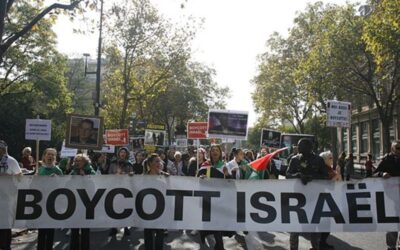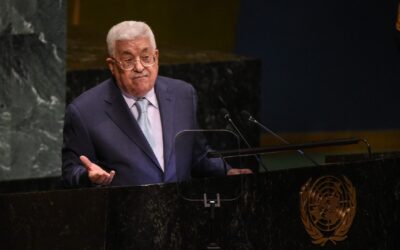Inspired by US protests, Ethiopian-born Israeli ministers battle against police brutality
By Danny Zaken
June 18, 2020
 The May 25 killing of George Floyd by a Minneapolis police officer and the protests that followed reminded many in Israel of similar cases right here in the Middle East. The most prominent ot these in Israel was the killing of Solomon Tekah by a policeman in July 2019. The official investigation of that event has yet to be completed. At the time, Mazal Mualem wrote in Al-Monitor that the protest that erupted after Tekah’s funeral was one of the most violent that Israel has seen since the country was founded. It gave voice to the deep crisis in trust between a marginalized group in Israeli society and the various law enforcement agencies, chief among them the police and its Internal Affairs division. For Israelis of Ethiopian origin, these two groups personify the institutionalized racism they face because of the color of their skin.
The May 25 killing of George Floyd by a Minneapolis police officer and the protests that followed reminded many in Israel of similar cases right here in the Middle East. The most prominent ot these in Israel was the killing of Solomon Tekah by a policeman in July 2019. The official investigation of that event has yet to be completed. At the time, Mazal Mualem wrote in Al-Monitor that the protest that erupted after Tekah’s funeral was one of the most violent that Israel has seen since the country was founded. It gave voice to the deep crisis in trust between a marginalized group in Israeli society and the various law enforcement agencies, chief among them the police and its Internal Affairs division. For Israelis of Ethiopian origin, these two groups personify the institutionalized racism they face because of the color of their skin.
Maybe that’s why the first step taken by Deputy Minister of Public Security Gadi Yevarkan (Likud), himself the child of Ethiopian immigrants, was to propose legislation to dismantle Internal Affairs and replace it with a new agency under the auspices of the Justice Ministry. Headed by a judge, that body would have much broader powers than the current Internal Affairs division now wields. Upon submitting his proposed legislation, Yevarkan said that policemen who fail to follow the law should be severely punished.
The solution for dealing effectively with the attitude of the authorities in general and law enforcement in particular is probably the inclusion of blacks — Israelis of Ethiopian origin in the case of Israel — and other minorities in key positions of power. In Israel’s current unity government, there are two such people. The first is Yevarkan, of course, who was appointed deputy minister of public security, who is responsible for the police but also for the integration of Ethiopian immigrants in the police force. An even more senior position is held by Knesset member Pnina Tamano-Shata (Blue and White), minister of immigrant absorption. She is the first woman from the Ethiopian community to serve in the Knesset, and now she is also that community’s first minister.
Tamano-Shata has proven herself in the battlefield over these issues from a very young age. Born in the Gondar district of Ethiopia, she was three years old when she immigrated to Israel as part of Operation Moses, together with her father and five siblings. They crossed the desert of Sudan on foot until they reached a remote meeting point, from where they were flown to Israel. The story of the community’s immigration by way of Sudan is told in the film “Red Sea Diving Resort,” or as it is also known “Operation Brothers” (2019).
In interviews she gave following her appointment, Tamano-Shata described the three-year-old girl who trekked across the desert to Israel without her mother, her adolescence in Israel and the struggles she led — and continues to lead — on behalf of the community, its integration and acceptance of the other, but also against blatant racism and discrimination.
She is a fighter, too. When she was just five, she joined her father at a demonstration in front of the Knesset against the Chief Rabbinate, which questioned the Jewish identity of Ethiopian immigrants and demanded that they convert again. She carried on the struggle as a young Knesset member. This came in the wake of an investigative report, which found that unlicensed and inexperienced mohels were being sent to circumcise the infant sons of Ethiopian immigrants, because, “They don’t understand. They’ll never feel it if the mohel makes a crooked cut.”
After calling for the matter to be brought up before the Knesset’s Interior Committee, she gave an impassioned speech, saying, “We have become pawns in the hands of anti-Semites who hate Jews. No one has the right to challenge our Judaism. … Is it because of my skin color? If that ever happened to immigrants from Europe, there would be a worldwide ruckus. This is a country that hates black people and hates Jews. My grandfather carried the Torah scroll from our village all the way to Israel, and you are calling into question whether he is Jewish?”
These harsh remarks caused a huge commotion at the time, but even now that she is part of the government, she claims to be there to instigate change but from the inside. After the George Floyd incident and the ensuing protests, Tamano-Shata said that the Israeli Police and the government itself must wake up and show that they are aware of systemic racism and discrimination, particularly within law enforcement. She argued that Israeli society can no longer accept the structural distortions that result in a disproportional number of Ethiopians in prison, considering their overall percentage of the population. Furthermore, there are many more police investigations centering on Israeli-Ethiopians who are charged with particularly minor crimes. In other words, the community faces excessive policing.
Demonstrations broke out in 2015 after an Ethiopian soldier named Damas Pakada was beaten by a member of the riot police. These demonstrations soon became riots. The demonstrators threw rocks and bottles at the police and smashed store windows; the police responded with stun grenades, water cannons and tear gas. In many ways, these demonstrations were more reminiscent of recent events in the United States. The government responded by deciding to establish a Unit to Combat Racism, among other things. The new unit recommended that thousands of cases against young Israelis of Ethiopian origin charged with minor crimes be dropped. The unit also collects data about institutional and other types of racism. Its most recent report, from 2019, found that 37% of the complaints it handled came from the Israeli-Ethiopian community. The report also notes that while Jews of Ethiopian origin make up 1.7% of the population, they make up 3.27% of the number of people arrested.
After the George Floyd incident, Yevarkan wrote on Facebook, “This is one of the most racist, cruel and deadly events ever recorded. The case proves again that racism is a lethal weapon. … Police violence against blacks is a plague, with many countries around the world fighting against it. … Here in Israel, we also have a lot to do. Policemen and women need to understand that they have enormous power, but also that they must use it proportionally, in accordance with the law, common sense and basic morality. One thing people must know is that white citizens of Israel feel safe when there is a police car in the neighborhood, while black citizens of Israel do not feel safe at all.”
The very fact that Yevarkan and Tamano-Shata were appointed to senior positions in government is especially important to the fight against institutional racism. Their test will be whether they succeed in bringing about real change in the coming years.
Adapted from: https://www.al-monitor.com/pulse/originals/2020/06/israel-us-ethiopia-george-floyd-racism-police-brutality.html#ixzz6PkTzf27o
See: Plight of Ethiopian Israelis (Video)
https://www.presstv.com/Detail/2019/03/13/590893/Plight-of-Ethiopian-Israelis
Distributed by PAJU (Palestinian and Jewish Unity)
PAJUMONTREAL.ORG/EN

